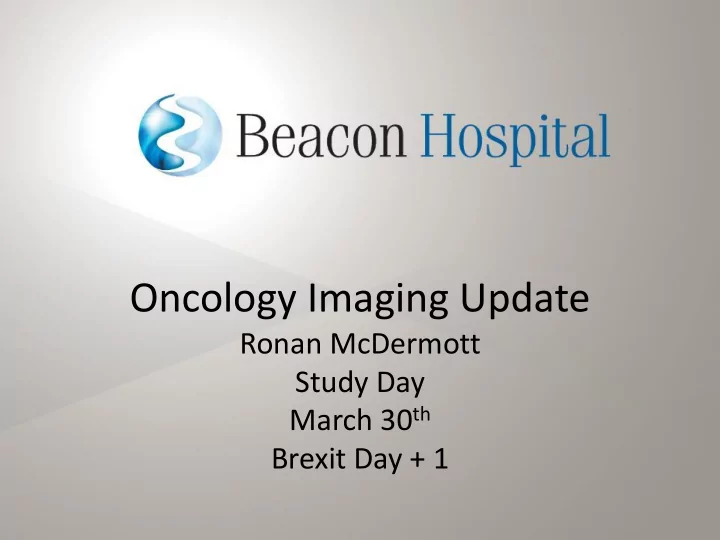

Oncology Imaging Update Ronan McDermott Study Day March 30 th Brexit Day + 1
Prostate Cancer
Prostate Cancer
Prostate Cancer
Prostate Cancer: Staging • CT TAP • Bone Scintigraphy • CT: sens. 42%, spec. 82% • Bone scan: PSA > 10 ng/ml
Ga 68 PSMA PET • Prostate Specific Membrane Antigen (PSMA) • Trans-membrane Glycoprotein • Over-expressed in Prostate Cancer x 15 • Particularly – high grade tumours – under androgen deprivation – In hormone refractory metastatic disease • First Ga 68 PSMA PET scan in Ireland performed Feb 20 th 2019 in St James’s
Ga 68 PSMA PET • Almost all prostate cancer cells express PSMA – ~15 times higher expression of PSMA in prostate cancer than normal tissue • PSMA expression correlates with Gleason score – Higher expression of PSMA correlates with worse outcomes • Higher diagnostic efficacy compared to conventional imaging including PET with choline tracers • Radionuclide therapy (Lu-177 PSMA)
Ga 68 PSMA PET • Ga 68 • Positron emitter • 68 minute half life • Germanium source • Generator shelf life of 6-12 months
FDG PET
Ga 68 PSMA PET
Primary Staging • Superior to conventional imaging in staging high risk primary disease (D’Amico classification) • Nodal and Distant Metastases • May downstage patients who are considered metastatic on conventional disease Maurer T et al. J Urol 2016;195(5):1436 – 1443.
70yo Gleason 4+5
Gleason 4+5
Localisation Intraprostatic Disease • Sensitivity • MRI 43% • Ga 68 PSMA PET 64% • Ga 68 PSMA PETMR 76% Mottet at al. Eur Urol 2011;59(4):572 – 583.
Biochemical Recurrence • Increased detection of metastatic sites vs. conventional imaging 1 • Advantage most evident in patients with low PSA levels 2 : – Overall detection rate 89.5% – PSA > 2ng/ml 96.8% – PSA 1 - 2 ng/ml 93.0% – PSA 0.5 - <1.0 ng/ml 72.7% – PSA 0.2 - <0.5 ng/mL 57.9% 1. Afshar-Oromieh A et al. Eur J Nucl Med Mol Imaging. 2014;41(1):11 – 20. doi: 10.1007/s00259-013-2525-5. 2. Eiber M et al.. J Nucl Med. 2015;56(5):668 – 674. doi: 10.2967/jnumed.115.1
Intensity of PSMA uptake varies with PSA level PSA 0.4ng/ml 1.5 6.3 Courtesy K. Zukotynski MD
Improved Detection of Recurrent Disease at low PSA levels Afshar-Oromieh A et al. Eur J Nucl Med Mol Imaging 2015;42(2):197 – 209
65yo 9 yrs post Sx. PSA 0.76ng/ml
81yo 3yrs post RT PSA 4.0 ng/ml
Pitfalls • Coeliac ganglion uptake – Up to 89% 1 • Bladder/ Renal excretion – Rewindow/ post mict. • Benign lesion uptake – Thyroid/ adrenal adenoma, schwannoma • Other cancer uptake – Adenocystic ca, HCC, glioblastoma – Neovasculature lung, colon, clear cell renal cell Krohn T et al. Eur J Nucl Med Mol Imaging. 2015;42(2):210 – 214. doi: 10.1007/s00259-014-2915-3
False Negative PSMA PET 5-8%
Conclusion • Ga 68 PSMA PET CT is a new reference standard for imaging prostate cancer • Superior Sensitivity and Specificity compared to conventional imaging • Minimize false positive findings with knowledge of the physiological distribution • May have role in other tumours (RCC) Krohn T et al. Eur J Nucl Med Mol Imaging. 2015;42(2):210 – 214. doi: 10.1007/s00259-014-2915-3
Thank You
Recommend
More recommend